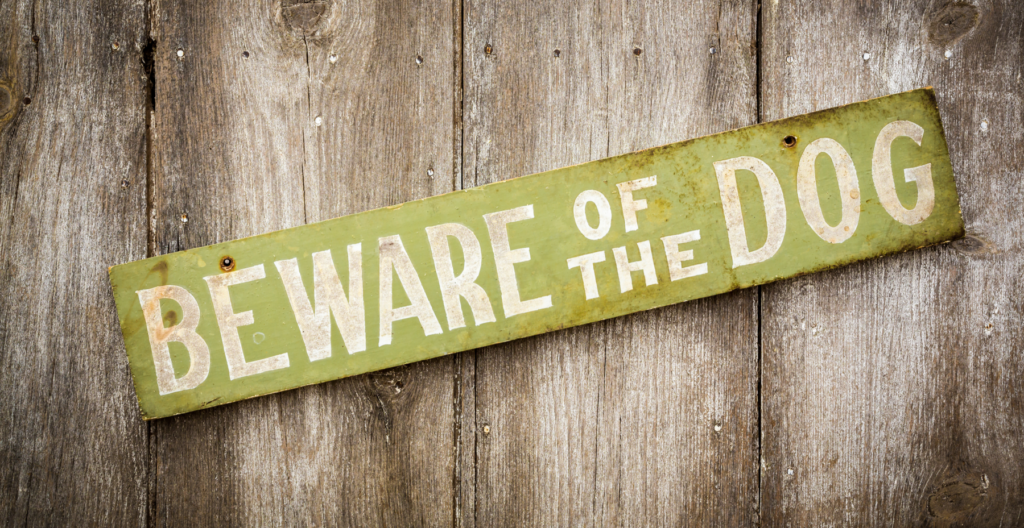On April 17, 2025, the New York Court of Appeals handed down a groundbreaking decision in the case of Flanders v. Goodfellow. This ruling changes how New York courts will handle dog bite and animal injury cases going forward.
It’s big news for both pet owners, who now have an increased exposure to liability for their animals, and people who have been hurt by animals, who now have a second avenue to sue for injuries.
What Happened in Flanders v. Goodfellow?
Rebecca Flanders, a postal worker, attempted to deliver a package to a house owned by Stephen and Michelle Goodfellow. She was on the porch and as she handed the package to Stephen, their 70-pound dog ran past him and attacked her, tearing a muscle in Flander’s shoulder requiring multiple surgeries and leaving permanent scarring. Flanders sued the Goodfellows, claiming:
- Strict Liability: Flanders argued that the Goodfellows knew or should have known their dog was dangerous because of its behavior.
- Negligence: Flanders claimed that the Goodfellows failed to prevent the attack by not having proper control of their dog.
The lower courts (Supreme and Appellate) did not agree with Flanders and dismissed her negligence claimed based on an older case, Bard v. Jahnke, which made it difficult for people to sue for negligence in animal injury cases. Flanders disagreed and appealed to New York’s highest court, the Court of Appeals.
The Court of Appeals Makes a Landmark Ruling
In its decision, the Court of Appeals changed the game for animal injury cases.
-
Affirmed Strict Liability
Strict liability means pet owners are responsible if they knew or should have known their animal had “vicious propensities.” This includes biting and lunging. New York has had the “one bite rule” for over 100 years, meaning liability attaches to a dog owner and property owner only if they had knowledge of some previous bad behavior, such as a prior bite, alas the “one bite rule”.
-
Added Negligence Claims
The Court of Appeals overturned Bard v. Jahnke, a ruling which previously blocked negligence claims against pet owners, limiting victims to strict liability. The Court decided this was outdated, complicated, and unfair to victims. Animal injury victims can now sue for negligence if a pet owner did not act reasonably to prevent harm, even if the animal had no prior bites.
The Court reinstated Flanders’ negligence claims and sent it back to the Supreme Court.
What This Means for Victims of Animal Injury
The New York Court of Appeals’ decision in Flanders creates a new approach where victims can pursue both:
- Strict Liability: If an owner knew or should have known their animal was dangerous.
- Negligence: If an owner did not take reasonable steps to prevent harm.
The negligence option removes the hurdle of proving an owner’s prior knowledge, which often stopped cases from moving forward. This makes it more achievable for a victim to recover compensation, especially for first-time attacks. Victims of dog bites or other animal attacks gain significant advantages from the Flanders ruling.
What Victims of Animal Injury Should Do
-
- Document Everything: Take photos of your injuries, the attack site, and any contributing factors (i.e., an open door). Make a list of witness names. File a police report.
- Seek Medical Attention: Seek treatment immediately. Keep detailed records of bills, diagnoses, and recovery.
- Hire a Competent Personal Injury Trial Lawyer: An experienced attorney can evaluate both strict liability and negligence claims, building the strongest case possible.
- What You Can Recover: Compensation can cover medical bills, copays, lost income, pain, suffering, scarring, and emotional. Severe cases often justify substantial awards.
What This Means for Pet Owners
Pet owners now have more responsibility than ever. You are not just responsible if you knew your pet was dangerous. If you fail to take common-sense precautions—like securing a dog that might escape—you could face a negligence lawsuit. Even if your dog has never bitten before, if it lunges at strangers and then attacks due to your oversight, that lack of control you could hold you responsible.
What Pet Owners Should Do:
-
- Secure Your Property: Use sturdy leashes, lock gates, or install fences to keep pets contained. Crates are useful when visitors are expected.
- Warnings: Post “Dog on Premises” signs to alert strangers. This shows you are trying to be responsible and can help in court if there is an incident.
- Training: Enroll your dogs in obedience classes to reduce bad behaviors. A well-trained pet is less likely to cause harm.
- Stay Alert: Watch for signs of aggression, like excessive barking or growling. Even if your pet has not attacked, these behaviors could suggest a risk that courts will examine closely.
- Protect Your Finances: Consider getting pet liability insurance and a Personal Liability Umbrella that specifically covers your dogs to cover legal fees and injury damages if an incident occurs. Dog bite claims can be costly!
- Keep Records: Save proof of training, vet visits, or any steps taken to manage your pet. These documents can demonstrate your diligence if a lawsuit arises.
If you have been the victim of a dog bite or animal attack, or are the owner of a pet and have been sued, we can help you. Call us at 518-855-3535 and one of our Dog Bite lawyers will assist you.

